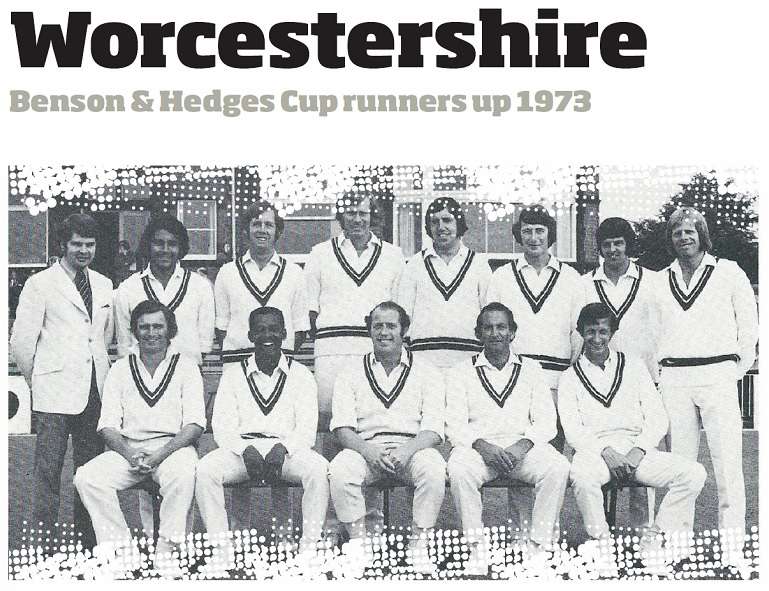Where are they now? Worcestershire – Benson & Hedges Cup runners-up 1973

By Neil Fissler
Alan Ormrod admits that this young Worcestershire side had a brilliant yardstick against which to measure their performances in the early part of the Seventies.
Less than a decade earlier the county had been a force in the domestic game winning back to back County Championships in an era when Yorkshire were sweeping all before them.
But then, after a lean spell, they re-discovered their winning touch in 1971, beating Essex to land the John Player Sunday League for the first time.
Two years later they reached the Benson & Hedges Cup final of the first time in only the second year of the competition.
And that proved to be the launch pad for them to go on and win a third Championship in ten years 12 months later.
“That was the yardstick for Worcestershire cricket from about 1961 until about 1966. In those five years we won the Championship twice and were runners-up twice,” said Ormrod.
“And we were in the Gillette Cup final twice and that was the ceiling everyone had to try and get to. That was a top side.
“And we were aspiring to be like that team, we always wanted to go out and get the results to get as close to them as we could.
“Worcester were always seen as a small county and we didn’t produce many home grown players so we had to rely on outside players coming in. And we struggled for a little but then we won the John Player League in 1971 and we started a surge again from there.
“In 1973 we were in the Benson & Hedges Cup final and then in 1974 we won the County Championship.
“In county cricket you need a bit of fortune and a bit of foresight where you know you are going to have your strongest side and you try and win your tournaments then.”
Worcestershire qualified for the semi-finals after seeing off Northants by 89 runs in the quarter finals after they failed to chase down 235.
In the last four they saw off Lancashire, losing fewer wickets after both teams scored 159 which they did with a wicket to spare.
In the Lord’s final, Kent batted first and made 225-7 and in reply Worcestershire were bowled out for 186 to lose by 39 runs.
Ormrod added: “It wasn’t really a great season for us except for getting to the Lord’s final. Generally our cricket wasn’t really up to scratch any more than in the final.
“Ironically, my strongest memories of our progress that year were not about the final itself when we lost convincingly but about the previous round.
“I remember the semi-final against Lancashire much better because we won on losing fewer wickets and it was a good period for them in one-day cricket. They were a good side.
“But we had the jinx on Lancashire, if you go back a couple of years to 1971 they were one of the teams we beat to the John Player League.
“In one-day cricket the best side on the day wins and they were consistent in their performances and that was the thing about them.
“We didn’t have the same talent as them but on the days that we beat them we played to our full potential.”
BACK ROW (left-right):
Rev Michael Vockins: Served as Worcestershire secretary until 2001 and was a clergyman for 26 years until his retirement in June 2014.
Ivan Johnson: All-rounder who went onto Fleet Street to work for The Sun as a sub-editor but is now back in his native Nassau, Bahamas, and runs a newspaper The Punch.
Rodney Cass: Wicketkeeper/ batsman who became an MCC coach. Continues to live in the Worcestershire area.
Jim Cumbes: Seamer who also played professional football. He became Warwickshire’s commercial manager then moved to Lancashire 1997, retiring as chief executive in 2012.
Jim Yardley: Middle order batsman became a sales rep for a drinks company and emigrated to Canada where was territory manager for The Premium Beer Company. He died in November 2010.
Keith Wilkinson: Batsman who worked as a buyer for a catalogue company based in Leeds and is now retired, living in Ilkley, West Yorkshire.
David Stewart: Batsman who played for Scotland where he settled, becoming a building society manager. Now lives in Blairgowrie, Perthshire, in retirement.
Ted Hemsley: Right-handed batsman who also played left back for Sheffield United, Doncaster and Shrewsbury. He became a turf accountant and then a betting ring manager.
FRONT ROW:
Alan Ormrod: Opening batsman. He coached Lancashire and then became director of cricket at Notts. Had run a flooring company while he played.
Ron Headley: West Indies batsman, like his father George, while his son Dean played for England. He became a cricket coach and ran a successful environmental businesses.
Norman Gifford: England left-arm spinner who was 48 when he retired. Later coached Sussex, Durham and Ardingly College and returned to Worcestershire in 2012 as a part-time spin bowling coach.
Basil D’Oliveria: New Road legend. Coached the county for a decade and died in November 2011, aged 80. His son Damien and grandson Brett have also played for the county.
Brian Brain: Seamer lives in Worcester. Has worked in personal finance management and been a director of a textiles firm in Warwickshire.
NOT PICTURED:
Glenn Turner: One of New Zealand’s most prolific ever batsman he stayed in the game as coach, manager, chairman of selectors and then high-performance talent scout for New Zealand Cricket.
Bob Lanchbury: Batsman who has represented the England deaf golf team. Has been managing director of industrial container stockists Patrico in Tewkesbury, Gloucestershire, for 24 years.
Vanburn Holder: West Indian fast bowler who became a first-class umpire in 1992 until his retirement in 2012. He now lives in retirement in Worcester.
This piece originally featured in The Cricket Paper on Friday December 4, 2015